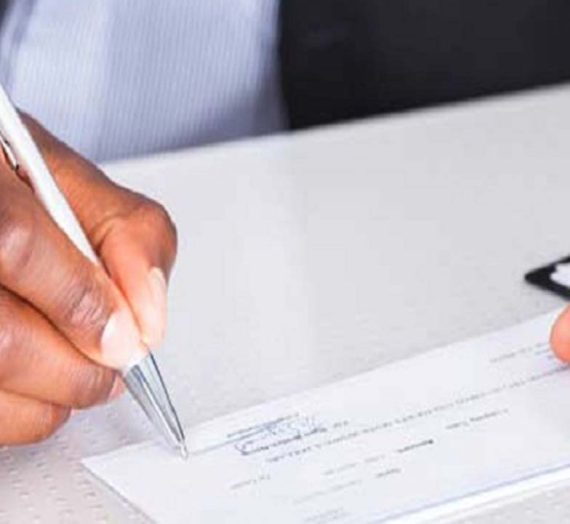A lot of people sign guarantor’s forms for loans collected by either their friend, family member or acquaintance without realizing the legal effect of the simple act of signing ‘as a guarantor’. Most times after signing, they feel that’s the end and they do not know what is primarily expected of them as guarantors. Some even feel or think that signing as guarantors is merely a way of offering a favor to a family member or friend who is taking a loan, starting out a job or under some other form of contractual obligation. This piece will enlighten you on these issues and much more.
What does it mean to be a guarantor?
According to Investopedia.com, a guarantor is a financial term describing an individual who promises to pay a borrower’s debt in the event that the borrower defaults on their loan obligation. The term “guarantor” is often interchanged with the term “surety.”
Guarantors are not only needed in loan agreements. In the circumstance a more encompassing definition would be; a guarantor also known as surety is an entity or person who agrees to be responsible for another party’s debt or performance under a contract, if the party fails to pay or perform.
So what is the legal effect of signing or acting as a Guarantor?
From the definition above, by signing as a guarantor, you are agreeing to repay the total amount owed if the borrower can’t pay what they owe.
Put differently, if for any reason the debtor taking the loan fails or is unable to pay back the debt, then as the guarantor, you immediately come under the burden to do so. Even the Supreme Court of Nigeria has made this point very clear. I will quote the words of the Court and proffer some further explanations;
“A guarantor is technically a debtor because where the principal debtor fails to pay his debt, the guarantor will be called upon to pay the money owed. However, the fact that the obligations of the guarantor arises only when the principal debtor has defaulted in his obligations to the creditor does not mean that the creditor has to demand payment from the principal debtor or from the guarantor or give notice to the guarantor before the creditor can proceed against the guarantor; nor does the creditor have to commence proceedings, whether criminal or civil, against the principal debtor unless there is an express term in the contract requiring him to do so.” C.B.N. v. Interstella Comm. Ltd.
So from the quote above some things are clear;
- As stated already, by acting as guarantor, you’re liable for that person’s loan if they don’t keep up with their payments. In other words, you have to make the payments instead.
- Therefore, immediately the actual debtor fails to repay the loan or keep his part of the bargain, your liability as a guarantor arises immediately.
- When this happens, especially in cases involving payment of money or repayment of loan, you as the guarantor, steps into the shoes of the debtor and become the debtor.
- Once that happens, the Bank (or other oblige) can come after you directly for the repayment of the loan. They ordinarily do not even have to ask the original debtor (who has failed to make payment) to repay first before asking that you repay the loan.
From the foregoing, it is clear that there are many risks to being a guarantor for a loan. Because when you sign as a guarantor for any person it is tantamount to you accepting to bear the liabilities and debts that such a person owes someone else. However, the fear that you as a guarantor may be responsible for the loan payments shouldn’t deter you from helping the other party. It is only expected that you know certain facts and understand the risks involved before signing as a guarantor.
Who can be a guarantor?
Often certain criteria are to be met before a borrower borrows and similarly before a guarantor can stand in for a borrower. Among which include; the guarantor and borrower must be of age (adults), the guarantor must show that he/she has a sufficient and stable income that can provide for the payment of the loan if it ends up becoming the guarantor’s responsibility. The guarantor must also in like manner show that he has no outstanding debt as this can deter his ability to make repayment if the need arises. The guarantor will also have to prove his possession of assets as these can be used by the bank to pay off the balance of the loan.
Simple safeguards when acting or signing as a Guarantor
- When signing or acting as a guarantor, it is important you know exactly what you are agreeing to. This is because by acting as a guarantor, you are accepting to be held responsible for the payment of the outstanding debt (or other obligation) if the borrower fails on his part to make payments. This invariably means your assets and income can be put at risk as they can be confiscated and used for the repayment of the debt.
- Before committing yourself to guaranteeing someone’s loan, you should ensure it is in writing and properly signed. Before signing, you have to be satisfied with the terms stated therein which can range from the amount of money for which you may be liable, the circumstance in which you might have to pay and the duration of your obligation as a guarantor. You also have the right to discuss the loan with a lawyer before the signing of the documents. Make sure the lender offers you a copy of the loan agreement so that you know the payment schedule and other relevant information in relation to the loan.
- Also endeavour to understand the reason why the borrower is being asked to get a guarantor. You should ensure that the borrower of the loan, you are acting or signing for, is actually capable of repaying the loan before you become part of the arrangement as a guarantor.
- As a guarantor, you are also likely faced with the inability to get a loan for yourself since you are already signed up for a borrower. Your own loan eligibility will automatically reduce, hence, once you are sure of taking a loan in no distant period, then it is advisable not to stand in or sign up as a guarantor for anyone.
In summary, signing or acting as a guarantor comes with legal liabilities. It is not just pen on paper and nothing more. Hence, when next you are called to act as guarantor to any party in a contract/agreement, be meticulous before rushing into such an arrangement.
Proverbs 22 v 26 and 27
“Don’t agree to guarantee another person’s debt or put up security for someone else. If you can’t pay it, even your bed will be snatched from under you.”
Written by Oluboyo Taiwo Olamide LLB (in view)

Oluboyo Taiwo Olamide SAL is an undergraduate of law of the University of Benin. He is a prolific writer who has written several legal articles. He was awarded the “2022 South South Legal Writer of the Year” as a result of his writing skills. He is the Chief Editor of several published magazines; The LAWSAN(South-South) CONVERGENCE(2.0) Magazine, My Body & I Foundation Magazine among others.
He is also a sound advocate of law who has represented his school in a number of national moot and mock competitions. Recently, in the month of April 2023, he represented his school and the country at large in the Philip C Jessup International Law Moot Court Competition in Washington DC, USA. As a result of his advocacy prowess, he was recently elevated to the most revered and highest attainable rank for student advocates in the faculty of law, Uniben – Senior Advocate of Lawsa (SAL).




fredericknkobowo
Thank you for your comment. We actually write the contents by ourselves. This is due to the fact that we want to be sure that the information we put out is well researched and reliable. We will look at the AI content writer you have suggested. You can send us an email via lawgicallyspeakingng7@gmail.com if you desire further communications or collaboration. Thank you a million.
Amos osayande
What of if someone use your details to take loan illegally without you knowing, what is going to be outcome? Are you going be debited or arrested
fredericknkobowo
Thank you for your question. First as we have mentioned it is not a crime to be indebted. Therefore even if someone used your details, you should ‘ordinarily’ not be arrested for that, unless there is reason to believe or suspect it was part of some financial scam orchestrated by yourself in joint operation with the other person. And if someone used your details to obtain the loan without your consent, do well to reach out to the creditor and explain the situation. As necessary get the services of a lawyer to help you navigate the situation as well.